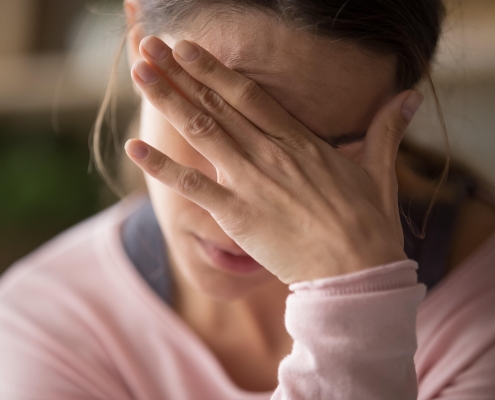How to calm anxiety
When anxiety was great within me, your consolation brought me joy.
Psalm 94:19
When anxiety was great within me, your consolation brought me joy.
Psalm 94:19
Anxiety is a natural human emotion characterized by feelings of worry, nervousness, or unease about something with an uncertain outcome. It is a common reaction to stress, and it can manifest in various ways, such as physical symptoms (e.g., rapid heartbeat, sweating, trembling) or psychological symptoms (e.g., racing thoughts, difficulty concentrating). While mild anxiety can be a normal part of life, severe or persistent anxiety can interfere with daily activities and may require professional intervention. Anxiety disorders, such as generalized anxiety disorder (GAD), panic disorder, and social anxiety disorder, are characterized by excessive and persistent worry or fear that can significantly impact a person’s quality of life. Treatment for anxiety disorders may include therapy, medication, lifestyle changes, or a combination of these approaches.

Anxiety can be caused by a variety of factors, including genetics, brain chemistry, personality, and life events. Some individuals may be more predisposed to developing anxiety disorders due to genetic factors, while others may have imbalances in neurotransmitters, such as serotonin and dopamine, which can contribute to anxiety. Personality traits, such as being highly sensitive or having a tendency to worry, can also make individuals more susceptible to anxiety. Additionally, stressful or traumatic life events, such as a breakup, job loss, or the death of a loved one, can trigger or exacerbate anxiety symptoms. Other factors, such as chronic illness, substance abuse, or a history of abuse or neglect, can also increase the risk of developing anxiety disorders. It’s important to note that anxiety is a complex and multifaceted condition, and its causes can vary widely from person to person.
Common signs of anxiety include excessive worry or fear, restlessness, irritability, difficulty concentrating, muscle tension, and sleep disturbances. Physical symptoms, such as rapid heartbeat, sweating, trembling, shortness of breath, and gastrointestinal problems, may also be present. In more severe cases, individuals may experience panic attacks, which are sudden and intense episodes of fear or discomfort that can include symptoms such as chest pain, dizziness, and a sense of impending doom. It’s important to note that experiencing occasional anxiety is normal, but if these symptoms persist or interfere with daily activities, it may be a sign of an anxiety disorder that requires professional evaluation and treatment.
 Anxiety is often described as a sense of unease or worry that can range from mild to severe. Physically, it may manifest as a rapid heartbeat, sweating, trembling, or muscle tension. Mentally, it can cause racing thoughts, difficulty concentrating, and a sense of impending doom or danger. Emotionally, anxiety can lead to feelings of fear, restlessness, irritability, or a sense of being overwhelmed. Some individuals may also experience physical symptoms such as shortness of breath, chest pain, or gastrointestinal problems. It’s important to note that anxiety can vary in intensity and duration, and it can affect different people in different ways. If you are experiencing symptoms of anxiety that are interfering with your daily life, it is important to seek professional help.
Anxiety is often described as a sense of unease or worry that can range from mild to severe. Physically, it may manifest as a rapid heartbeat, sweating, trembling, or muscle tension. Mentally, it can cause racing thoughts, difficulty concentrating, and a sense of impending doom or danger. Emotionally, anxiety can lead to feelings of fear, restlessness, irritability, or a sense of being overwhelmed. Some individuals may also experience physical symptoms such as shortness of breath, chest pain, or gastrointestinal problems. It’s important to note that anxiety can vary in intensity and duration, and it can affect different people in different ways. If you are experiencing symptoms of anxiety that are interfering with your daily life, it is important to seek professional help.
When experiencing an anxiety attack, it’s important to focus on calming the mind, body, and spirit. First, try to find a quiet and safe space where you can sit or lie down comfortably. Take slow, deep breaths in through your nose and out through your mouth, focusing on the sensation of your breath entering and leaving your body. You can also try progressive muscle relaxation, where you tense and then release each muscle group in your body, starting from your toes and working your way up to your head. Engaging in activities that distract your mind, such as listening to calming music, reading Scripture or focusing on a specific object, can also be helpful. Additionally, practicing mindfulness or spiritual disciplines such as prayer can help you stay grounded and present in the moment. If you have a trusted friend or family member nearby, you can also reach out to them for support and reassurance. Remember that anxiety attacks are temporary and will pass, and it’s important to prioritize calming practices and seek professional help if needed.
Pregnancy can bring about a range of emotions, and it is common for expectant mothers to experience anxiety. When facing an anxiety attack during pregnancy, it’s important to prioritize your mental, spiritual, and physical well-being. Begin by finding a quiet and safe space where you can sit or lie down comfortably. Practice deep breathing exercises, focusing on inhaling slowly through your nose and exhaling through your mouth. Progressive muscle relaxation can also be beneficial. Engaging in activities that distract your mind, such as listening to calming music, or focusing on a specific object can also be helpful. Remember to prioritize calming activities such as mindfulness or spiritual disciplines such as prayer, and seek professional help if needed, as managing anxiety during pregnancy is crucial for both your and your baby’s health.
 Coping with an anxiety attack at night can be particularly challenging due to the lack of distractions and the potential for sleep disruption. To help calm an anxiety attack during nighttime, it is important to create a calming environment. Start by dimming the lights and eliminating any sources of noise or distraction. Practice deep breathing exercises, focusing on inhaling slowly through your nose and exhaling through your mouth. Progressive muscle relaxation can also help. Engaging in activities that distract your mind, such as reading Scripture or listening to calming music, can also be helpful. Additionally, consider practicing relaxation techniques such as mindfulness or spiritual disciplines such as prayer to help you stay grounded and present in the moment. If your anxiety attack persists or worsens, it may be helpful to seek professional help.
Coping with an anxiety attack at night can be particularly challenging due to the lack of distractions and the potential for sleep disruption. To help calm an anxiety attack during nighttime, it is important to create a calming environment. Start by dimming the lights and eliminating any sources of noise or distraction. Practice deep breathing exercises, focusing on inhaling slowly through your nose and exhaling through your mouth. Progressive muscle relaxation can also help. Engaging in activities that distract your mind, such as reading Scripture or listening to calming music, can also be helpful. Additionally, consider practicing relaxation techniques such as mindfulness or spiritual disciplines such as prayer to help you stay grounded and present in the moment. If your anxiety attack persists or worsens, it may be helpful to seek professional help.